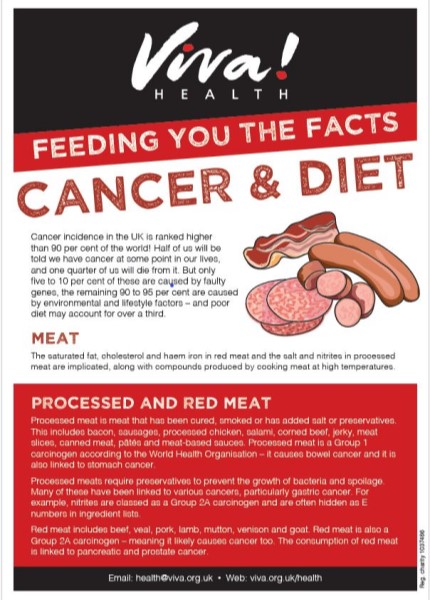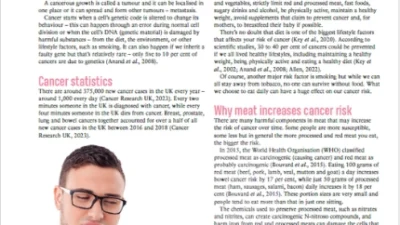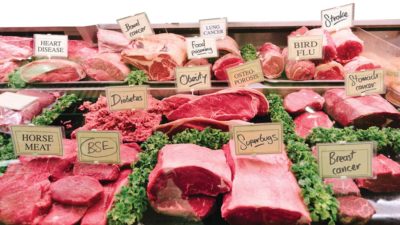Mini factsheet: Cancer and diet

Cancer incidence in the UK is ranked higher than 90 per cent of the world! Half of us will be told we have cancer at some point in our lives, and one quarter of us will die from it. But only five to 10 per cent of these are caused by faulty genes, the remaining 90 to 95 per cent are caused by environmental and lifestyle factors – and poor diet may account for over a third.
Meat
The saturated fat, cholesterol and haem iron in red meat and the salt and nitrites in processed meat are implicated, along with compounds produced by cooking meat at high temperatures.
Processed and red meat
Processed meat is meat that has been cured, smoked or has added salt or preservatives. This includes bacon, sausages, processed chicken, salami, corned beef, jerky, meat slices, canned meat, pâtés and meat-based sauces. Processed meat is a Group 1 carcinogen according to the World Health Organisation – it causes bowel cancer and it is also linked to stomach cancer.
Processed meats require preservatives to prevent the growth of bacteria and spoilage. Many of these have been linked to various cancers, particularly stomach cancer. For example, nitrites are classed as a Group 2A carcinogen and are often hidden as E numbers in ingredient lists.
Red meat includes beef, veal, pork, lamb, mutton, venison and goat. Red meat is also a Group 2A carcinogen – meaning it likely causes cancer too. The consumption of red meat is mainly linked to bowel cancer but is also linked to pancreatic and prostate cancer.
Cooked meat
Due to the risk of food poisoning, meat must be cooked to destroy harmful bacteria. However, cooking at high temperatures creates carcinogenic compounds linked to bowel cancer. Grilling and barbequing meat (and fish) creates especially high amounts of these. The type of iron found in meat, haem iron, has also been linked to bowel cancer.
Cow’s milk
Cow’s milk contains and also stimulates production in the body of the growth hormone IGF-1. In a calf, it drives rapid growth. In the lab, IGF-1 stimulates growth in human cancer cells and in people, it’s linked to an increased risks of breast and prostate cancer. Vegans tend to have lower levels.
Bad fats
Red meat, chicken and high-fat dairy products (hard cheeses, cream and butter) are high in saturated fat, which is linked to an increased risk of breast, prostate and bowel cancer.
Soya protects
Phytoestrogens are found in many fruits, vegetables, wholegrains and pulses such as soya. These are plant chemicals that are similar in structure but between 100 to 100,000 times weaker than mammalian oestrogens found in cow’s milk, which are identical to human oestrogen. Many of the concerns over soya originate from animal studies, which don’t apply to humans as phytoestrogens act very differently in different species. Research suggests soya may actually lower the risk of breast cancer and its recurrence.
How to reduce your risk?
The majority of cancers are preventable. To lower your risk choose a varied vegan diet containing plenty of fresh fruit and vegetables, wholegrain foods, pulses, nuts and seeds. This will provide bowel-protecting fibre, a rich source of vitamins, minerals and antioxidants that help combat harmful molecules called free radicals. A large UK study on diet and cancer found that compared to meat-eaters, cancer incidence was 12 per cent lower in fish-eaters, 11 per cent lower in vegetarians and 19 per cent lower in vegans.
Bottom line
Consuming animal products increases the risk of various cancers, whereas a varied vegan diet has a protective effect – it’s an easy choice!
This post has been categorised in: All Print Materials, Mini factsheets







